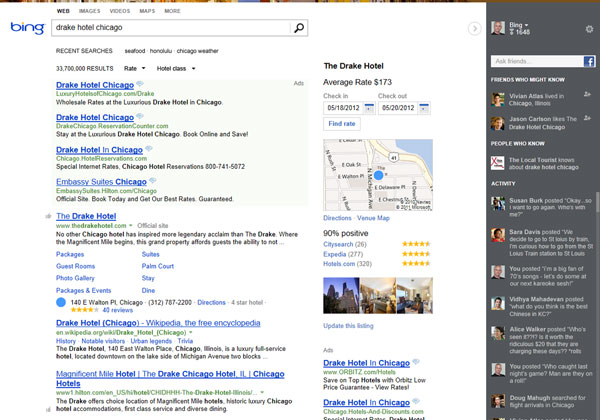
iCloud, iOS 6 and other Apple leaks are all about Facebook's IPO
Apple execs all follow the same party line: They don't talk about forthcoming products. But somebody often does, perhaps coordinated with public relations folks or even careful disclosure from someone on Apple's board. Whom isn't so much important as someone does. As I've observed for years, leaks' timings are fairly consistent -- either to lift the share price or steal some other company's thunderous announcement. I can't help but see both in several seemingly strategic leaks, starting with today's disclosure about iOS 6 features.
The Wall Street Journal reports that iCloud will get new photo- and video-sharing capabilities, which include comments and availability outside Photo Stream -- meaning people don't have to own a fruit-logo product to view them. Apple reportedly is extending photo capabilities, while adding video-sharing as feature set. Today's leak follows another -- this one from 9to5 Mac, claiming Apple will dump Google Maps for its own service in iOS 6. Both leaks communicate that Apple is serious about social cloud services and search, and I don't believe they're coincidentally timed, given Facebook's imminent IPO.

Yahoo ousts CEO Scott Thompson, and I ask: 'What the frak?'
So let me see if I understand rightly. It's okay for CEOs to lie, steal, cheat, take ungodly salaries and -- worse -- huge bonuses while companies flounder, commit insider trading and abuse shareholder trust in just about every way possible, but lie on the résumé and it's adios, baby? Somebody wake me from this nightmare -- or perhaps Scott Thompson, who is out as Yahoo chief executive.
Yahoo tacitly confirmed Thompson's exit today, in an announcement about Ross Levinsohn assuming position of interim CEO: "Levinsohn replaces Scott Thompson, former chief executive officer, who has left the company". That is one big middle finger. There is no explanation -- not even a fine he left for personal reasons -- or praise for his short time running Yahoo. Thompson leaves with a big stake in his heart implanted from behind.

Don't miss one of the week's exciting 25 software downloads
The second week of May has passed, and it was as busy as ever in the world of software. If you haven’t kept your finger on the pulse, we have put together this roundup to bring you back up to speed.
Windows users looking to bring one of the features of OS X to their PCs will be interested in TweakNow DriveShortcut 1.0.0, which can be used to automatically create desktop shortcuts whenever removable media is inserted. If you’re looking to clean up your hard drive, the release of GeekUninstaller 1.0.0.2 is very timely, while EASEUS Todo Backup Free 4.5 has been updated with support for Windows 8 -- if you want to protect your valuable files. In a similar vein is Acronis True Image Home 2012 (Update 2) v15.0.7119, which has been enhanced with a number of tweaks and new features.

Mom is a Google girl
I never expected my 70 year-old mother to ride the cutting edge of technology, but she's there, living in the cloud, which she embraces enthusiastically. What's that saying about not teaching old dogs new tricks? Perhaps you can.
Mom's daily tech is way out there, and you can blame or credit me for lifting her there. But she's a willing participant, happily adopting new habits, which in the end wasn't so difficult once she recognized the benefits. Perhaps your mother will, too, if you give her the chance. Mom uses Android phone (Samsung Nexus S), Chromebook (Google Cr-48) and Google TV (Logitech Revue). She lives in the cloud via these Google-powered devices and associated services.

Apple is replacing Google maps in iOS 6? You don't say
The tech blogosphere is abuzz today following a report by Apple news site 9to5Mac claiming "trusted sources" say Google Maps will get the boot in iOS 6, replaced by an in-house solution. It is no secret these two companies have an increasingly strained relationship, and Apple's acquisitions point towards a future in maps.
In the newsroom this afternoon, we chalked this one up to "sourced conjecture": that is, while 9to5Mac may indeed have some kind of inside track to what Apple plans in the next version of iOS, it certainly doesn't take a brain surgeon to figure this one out. The writing's been on the wall on this one for three years, at least.

Affixa makes webmail work with your desktop apps
One of the major drawbacks of switching to a web-based email provider like Gmail or Yahoo is that your desktop hasn’t cottoned on to your new way of working. Sure, you can access your email via your web browser, effectively liberating you from a single email program on a single PC, but it seems your desktop hasn’t caught up with progress.
You’ll know what we mean: click an email link on a webpage, or attempt to attach a file to an email directly from another program and you’ll either open an unwanted relic from the past like Outlook, or get some error message. Before throwing your PC out of the window, however, discover how a free software program called Affixa can soothe your furrowed brow.

You can have iPhone 4S, I'll take Galaxy Nexus
During the last six months, I've had the privilege to use three exceptional smartphones: iPhone 4S and two Galaxy Nexus variants -- one LTE and the other HSPA+. You can't go wrong buying either Android or iOS handset, although Galaxy Nexus supports more carrier networks here in the United States. Differences that matter are more than hardware (such as size, appearance or battery life) or software (apps and operating systems). Taking Galaxy Nexus or iPhone 4S is much more. Either is a digital lifestyle choice that many buyers won't grok before paying their hard-earned cash.
I can't emphasize this aspect strongly enough. In the days before Android and iPhone, early smartphone buyers also made digital lifestyle choices, such as BlackBerry users and persistent email or Windows Mobile buyers wanting mobile Office. But today, with differentiated, connected cloud services, digital lifestyle matters more than ever, and both handsets offer similar yet drastically different experiences. You're not just buying a phone but a way of life.

Google prices out cloud SQL services for App Engine customers
Google has set fees for its cloud SQL storage offering, and detailed pricing on both a per-use and per-day model depending on the developer's need. The move is an effort to bolster App Engine, which is a service from Google that allows developers to run cloud applications on the company's infrastructure.
The Mountain View, Calif. company has offered Cloud SQL in a limited free beta since last October. Developers can continue to use Cloud SQL free of charge until June 12, however, after that continued use will require billing information.

Save big on these May software bargains
We’re nearly halfway through May, the weather’s getting warmer and there is a bunch of deals in the Downloadcrew Software Store if you’re looking to save on your purchases. Starting off this month’s selection of offers is a series of deals on TuneUp Utilities 2012 that includes everything you need to optimize, fix or customize your computer.
TuneUp Utilities 2012, complete with a 3-PC, lifetime non-expiring license can be yours for just $18.99, saving you 62 percent, while anyone who needs more licenses should take a look at TuneUp Utilities Business Edition 2012 [5-PC, lifetime license] which costs just $22.95 – saving of 73 percent. Looking to secure your PC as well as speed it up? Look no further than the TuneUp Utilities 2012 + AVG Internet Security 2012 bundle which costs just $22.95 (a saving of 80 percent) and the TuneUp Utilities 2012 + avast! Pro Antivirus 7 bundle which at just $19.95 will save you an impressive 78 percent off the MSRP.

Microsoft overhauls Bing in mission to innovate search
Microsoft on Thursday announced it will be rolling out the "most significant update" to its Bing search engine since it debuted three years ago.
The new Bing design eschews the decade-old single-page search result design that is a standard, and introduces a three-column interface that combines algorithmic search results (called "Core Web Results") with social network results (called "Sidebar" results) and actionable related services such as location, shopping, and more ("Snapshot" results).

HP pushes OpenStack cloud services into public beta
Today, HP made OpenStack available in public beta, announcing general availability of three services to customers: Cloud Compute, Cloud Object Storage and Cloud Content Delivery Network; they're available on a pay-as-you-go basis.
In September, the Palo Alto, Calif. company started offering the services to a limited number of customers. HP's move can also be viewed as a strengthened commitment to OpenStack itself. Competitor Citrix is going the opposite direction -- last month relinquishing to open source CloudStack code received as part of the acquisition of Cloud.com last year.

Don't be phished by tweet: 'Hey some person is saying horrible things about you'
Does reputation matter to you? Are you concerned what people say about you when you're not around? Perhaps you want to know what crap anonymous commenters post about you across the InterWebs? If the answer is "Yes" to any of these, you might be vulnerable to this tweet: "Hey some person is saying horrible things about you". Resist the temptation.
I got this one Monday and again yesterday. I started to ignore the tweet, but it came as direct message. So I clicked the shortened link, which brought me to the Twitter home page with message log-in failed. Immediately, I panicked, intuiting this likely was a phishing scam. Sure enough, Chrome revealed the fake URL and I backed off. But some other people haven't been so lucky, as Gartner analyst Mark McDonald confesses today. In reading his post, I realized it would be public service to share a bit about his experience and to warn others.

Dell looks to the cloud to stay relevant in the enterprise
Dell continued to expand outside of its traditional PC-based business this week, making two separate announcements that symbolize a larger emphasis on services -- especially for the cloud. The Allen, Texas based company has introduced a Desktop-as-a-Service offering through a partnership with Desktone, as well as a new offering aimed at moving their SAP solutions to the cloud.
The moves signal a bigger business shift for a company that for most of its 26-year history has focused on physical hardware. At the same time, it's a sign of the times in enterprise environments, a move towards virtualization and cloud-based services.

Is Adobe Creative Cloud a good value?
It's the question I've asked myself since Adobe unveiled the subscription service in late April; it launches May 11. For me, $49.99 a month is steep. But $29.99 strongly tempts. I'm eligible for that lower pricing, and you might be, too. But to get either price, Adobe requires 12-month commitment -- and gets 50 percent still, if you cancel early. Month-to-month option is $79.99 per 30 days, or $959.88 yearly versus $599.88 for standard annual subscription pricing.
You get a lot regardless of pricing plan -- more than 20 products now and others planned (I'm waiting for Photoshop Lightroom 4.x, Adobe), offering huge savings that surely will appeal to someone. For starters: student, sole-proprietorship or small business. Among the included products and list price, if purchased (rather than subscribed): Acrobat Pro ($499), After Effects ($799), Flash Pro ($599), Illustrator ($599), Photoshop Extended ($699) and Premiere Pro ($799).

The personal cloud is all about context
Gartner is back thumping about how the cloud will replace the PC as personal hub by 2014, and, whoa, that's not exactly so far away. I wrote the "ding dong, the PC's dead" last month. After identifying five trends then, the analyst firm today highlights three things cloud vendors had better watch out for.
Simply stated: "Mobility and location"; "platform independence"; and "seamless synchronization". That aptly describes what the cloud-connected -- oh, post-PC, if you insist -- era is all about: Personal computing anytime, anywhere on anything. However, many cloud offerings fall short of that definition and the three must-have characteristics Gartner defines.
